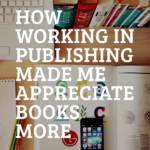I don’t know about you but whenever someone treats a book this way, I die a little bit inside. As someone working in the publishing industry, seeing mountains of scattered books like what I have witnessed makes me recoil. Now, I hope you don’t strike me as sentimental and dramatic. There’s a reason why I feel strongly this way.
My Early Days As a Publisher
Fresh from college and bewildered, I saw books as what they are—something that will entertain me or provoke my thoughts. There’s nothing that will make me deeply care. But since I got my foot in the door as an Editorial Assistant in a publishing house three years ago, it made me see books in a wholesome and different way. And as I go about my work, I started to realize that every book out there that is being pushed in the market has a story behind it. The story you read in between the pages isn’t the only story there is to it. The story behind its creation is also worth knowing. From an outsider’s point of view, the book production process might be a big puzzle. As readers and consumers, we generally don’t care about it as long as the books we love come out in the market. But as every production job out there, the books that we see on the shelves go through some several editorial processes. During my assistantship days, I remember handling up to ten book projects at the same time. I had to supervise their creation from an idea to a saleable product displayed on the shelves. Glory days. I remember those times I had to deal with grumpy authors and contributors; several sleepless nights editing manuscripts to hit targets; unpaid, take-home work just to meet deadlines; every refusal of the author to accept revisions; rejections of my favorite cover for a book; promotional budget cuts; the constant back and forth between departments…It’s the kind of grunt work that demoralized me but made me feel proud at the same time. I loved books so much that I “made” them, too.
My Book Projects As My “Children”
Every creative person that I know of has their own quirks. In our publishing house, we treated each of our book project as our own “children.” You don’t need effective parenting skills to know that if someone doesn’t treat your children well, you will likely get hurt. So with all these processes that happen behind the scenes, it made me appreciate more the value of a book. To see books being thrown around carelessly on the floor in a book fair, especially the ones I read and loved, makes me a little bit enraged. But of course, it’s not everyone’s fault if they don’t know how much love and care were poured by an editor into culminating those products. I don’t edit books anymore; I write about them as a writer and journalist. But that didn’t lessen my respect and admiration for those who work behind the scenes. Kudos to you all. Although my line of work changed a bit, I still treat every book I hold with care. Nowadays, whenever I go to a bookstore and see a book—even though it’s not one of my own “babies”—I smile and imagine the Editorial Assistant like I was who also pulled all the stops to make this world a better place, one book at a time.

